The Social Media Content Creation Market is estimated to be valued at USD 7.6 billion in 2025 and is projected to reach USD 29.5 billion by 2035, registering a compound annual growth rate (CAGR) of 14.5% over the forecast period.
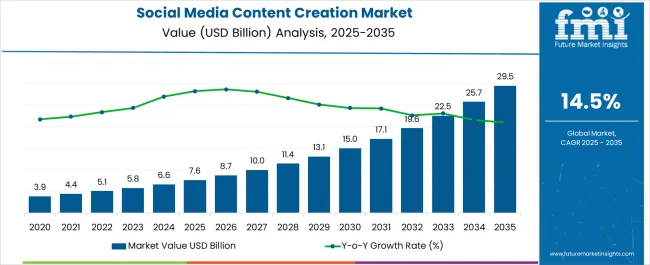
| Metric | Value |
|---|---|
| Social Media Content Creation Market Estimated Value in (2025 E) | USD 7.6 billion |
| Social Media Content Creation Market Forecast Value in (2035 F) | USD 29.5 billion |
| Forecast CAGR (2025 to 2035) | 14.5% |
The social media content creation market is undergoing a transformation fueled by shifting digital consumption habits, increasing creator monetization tools, and widespread adoption of short-form video platforms. Rising screen time and mobile-first engagement have made visual content the focal point of branding and customer outreach across sectors.
Advancements in AI-powered editing tools, analytics platforms, and creator economy infrastructure are enabling both individuals and businesses to produce high-quality content at scale. The integration of e-commerce features within social platforms has further elevated the importance of native content creation as a direct revenue driver.
As marketing strategies shift from static ads to immersive, storytelling-driven formats, demand for skilled content creators and scalable tools continues to expand. The market is expected to benefit from platform diversification, increased influencer collaborations, and enterprise adoption of in-house content studios to accelerate brand visibility and user engagement.
The market is segmented by Content Type, Enterprise Size, and End Use and region. By Content Type, the market is divided into Instagram Content Creation, Facebook Content Creation, Tiktok Content Creation, YouTube Content Creation, and Others. In terms of Enterprise Size, the market is classified into Small & Medium Sized Enterprise and Large Enterprise. Based on End Use, the market is segmented into Media & Entertainment, Travel & Hospitality, Retail, Education, Healthcare, Telecom & IT, and Others. Regionally, the market is classified into North America, Latin America, Western Europe, Eastern Europe, Balkan & Baltic Countries, Russia & Belarus, Central Asia, East Asia, South Asia & Pacific, and the Middle East & Africa.
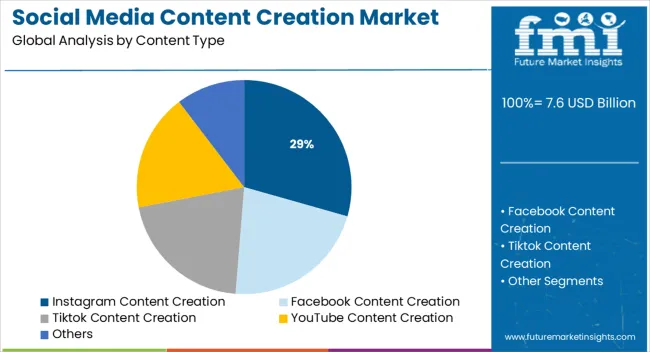
Instagram content creation is projected to account for 29.4% of total revenue in the social media content creation market by 2025, making it the leading content type. This dominance is being shaped by Instagram’s algorithmic optimization for visual storytelling and its integration of reels, stories, and shopping features, which drive high user interaction.
The platform's user-friendly tools for creators combined with its high engagement rates have positioned it as a preferred choice for both brand collaborations and influencer-driven campaigns. Content on Instagram tends to yield higher conversion rates due to strong visual appeal and immediacy, making it attractive for direct-to-consumer strategies.
The evolving ecosystem of creator monetization tools, in-app analytics, and API integrations is further enhancing scalability for professionals and enterprises alike.
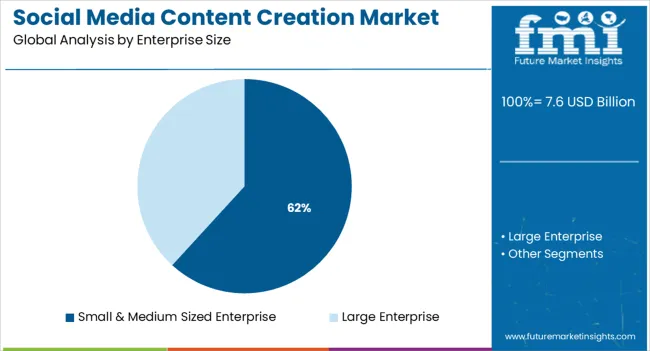
Small and medium-sized enterprises (SMEs) are anticipated to contribute 61.8% of the overall market revenue in 2025, ranking them as the top enterprise segment. This growth is being fueled by SMEs’ growing dependence on cost-effective digital marketing strategies to build brand awareness and engage niche audiences.
The low barrier to entry on social media platforms has enabled smaller firms to bypass traditional advertising and compete through creative storytelling, influencer partnerships, and localized content. SMEs are increasingly leveraging freelance creators, content automation tools, and performance analytics to optimize campaigns and drive ROI.
The flexibility to test and iterate content formats quickly aligns well with SMEs’ agile marketing approaches, reinforcing their leadership in this market.
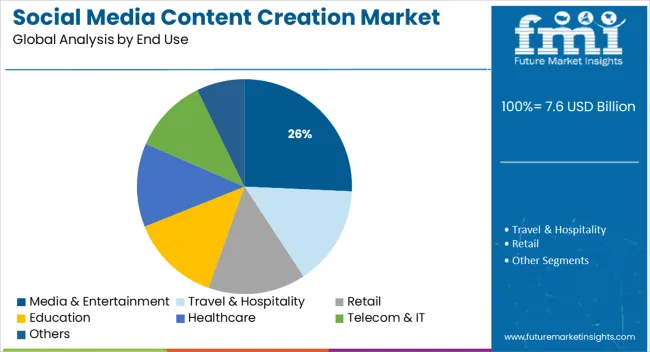
The media and entertainment sector is expected to account for 25.7% of the revenue in the social media content creation market in 2025, making it the leading end-use industry. This segment’s dominance is driven by the growing demand for real-time engagement, teaser campaigns, and multiplatform storytelling to promote entertainment assets.
Streaming platforms, studios, and production houses are investing heavily in curated social content to retain viewer attention and build cross-channel audiences. As audiences fragment across devices and geographies, social content creation has become essential to maintaining relevance and momentum for entertainment brands.
The use of behind-the-scenes content, interactive polls, and fan-driven challenges has further increased content velocity and user interaction, cementing media and entertainment’s position as a primary growth engine for the market.
During the projected timeframe, North America is expected to be the major revenue contributor to the digital content creation industry. This is chiefly due to strong technological development and widespread application of content-creation tools in a variety of end-user industry sectors such as the media and entertainment sectors throughout the region.
The social media content creation market in the United States is expected to be the dominant player with a market share of 87.2% and a CAGR of 13.9%. This is mainly attributable to the surge in the popularity of social media content creations in the United States.
The Asia Pacific is predicted to witness robust growth, introducing significant potential to social media services providers, due to rising demand for social media content creations in nations such as China, India, and Japan, which are concentrated on constructing strong online infrastructure and digital technology. During the projected timeline, the China social media content creation market is expected to grow at a CAGR of 14.4%.
The global social media content creation market is extremely competitive, with major competitors focusing their promotional efforts on increasing their customer base to establish a significant competitive edge.
Companies are focusing on increasing their client base to attain a competitive advantage in the market. As a consequence, a variety of agencies and businesses are engaging in a variety of strategic activities, such as mergers and acquisitions as well as collaborative partnerships and cooperation with other competing brands.
Some of the major market players include Denave, GroCurv Pvt. Ltd., Sociallyin LLC, Verblio, Pepper Content Pvt. Ltd., Giraffe Social Media, The Social Element, The Brains, and Lapaas Digital Pvt Ltd.
The primary trends fueling the global social media content creation market are increased IT expenditure, AI development, and cloud computing deployment.
Social media content creation development has a number of advantages, including cheap operating costs, ease of measurement and adjustment, high return on investment (ROI), and fueling the demand for social media content creation. Adoption of social media content creation is mainly due to brand extension, segmentation, precise targeting, and a focus on conducting business.
It also allows the company to communicate with its traffic audience, which helps to build brand scalability. To leverage on the surge of online traffic and obtain better visibility with individuals, B2B enterprises are increasingly relying on online marketing methods, promoting the social media content creation market.
A prominent factor projected to fuel growth of the global market over the forecast period is increasing demand for digitized material from various business sectors.
Increased technological advancements and product enhancements by manufacturers and software developers to integrate hardware with software applications to create digital content are expected to create significant opportunities for existing social media content creation players, as well as easy entry for new social media content creation players into the global market.
The demand for valuable material to improve brand status, a cost-effective way to engage with quality leads, and a rising trend toward digitalization to construct better marketing strategies are all driving the growth of the social media content creation market.
As an element of an organization's marketing strategy, the value of social media content development has grown. In order to improve customer in-store experiences, software providers in the social media content creation business are increasing their R&D activities.
The Amazon GoTM stores, for example, have set the bar for innovation in their interactive digital platform, which is known for its "grab and go" approach. As a result, prominent social media content creation market players are experimenting with fun marketing methods to attract customers to buy from them again.
Livestream buying on social media is an ecommerce practice that is opening opportunities in the social media content creation market. The continuous pandemic simply drove its rise, as brick-and-mortar purchasing was not as easily available as before. The short-form video is a social media content creation trend in 2025, given the growth in popularity of TikTok and Instagram's own assertion of video value.
In some fashion, all of the major social media networks currently support the video format of Stories. In 2025, there is a greater demand for social media risk management and mitigation, which means public relations and social media teams are working together.
Whether it's poor product feedback, site outages, becoming viral for the wrong reasons, or real-life catastrophes, brands must develop successful corporate communication plans that include social media content creation.
The media and entertainment business is at the forefront of collaborating and finding new ways to deliver stories to audiences through social media content creation tools, with an expected CAGR of 28.1% through 2035. In order to speed up production and postproduction processes, they are progressively investing in SaaS implementation.
In the near future, this trend is likely to open up profitable opportunities in the social media content creation market. For example, OTT service providers' growing demand for social media content creation boosted income creation.
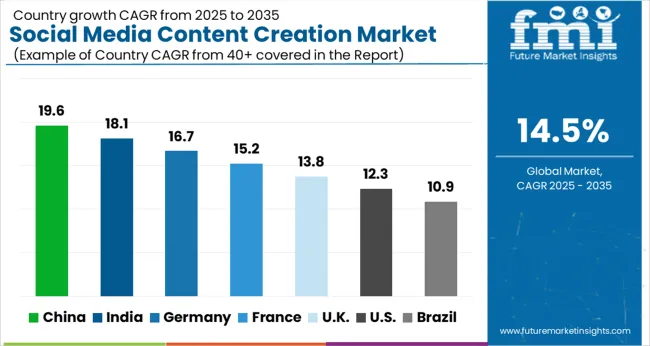
| Regions | CAGR (2025 to 2035) |
|---|---|
| United States | 11.9% |
| Germany | 10.7% |
| China | 15.9% |
| Japan | 12.2% |
| India | 14.2% |
Due to the rapid evolution of digital ecosystems and the significant expansion of social media platforms in this region, North America is likely to lead the social content creation market with an expected CAGR of 11.9% during the forecast period.
For example, the content and services ecosystem in the United States is bolstered by businesses that have turned their focus to online platforms for efficiency advantages, with shareholders backing research and better service growth.
Due to increased attention to marketing techniques and increased internet infrastructure in rising nations such as China, India, and Japan in the region, the Asia Pacific market is predicted to grow significantly in terms of revenue.
In the global social media content creation business, Asia Pacific is predicted to grow rapidly, where China held a CAGR of 15% and Japan with 12.2% in 2024. This can be due to the fast increasing social media business, as well as increased government attempts to improve social media infrastructure, with China taking the lead.
Government support for social media transformation, commercialization, and brand building has expanded in countries such as China, India, and Japan.
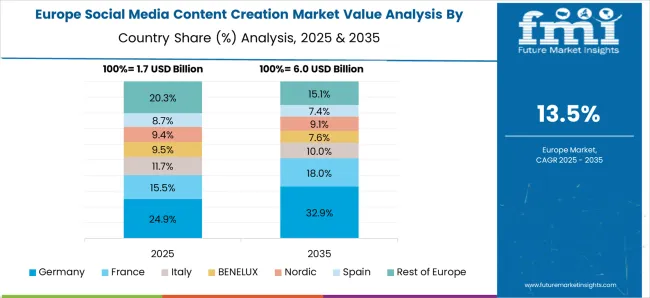
Due to growing awareness of the value of social media content in the marketing industry, the European market is predicted to rise rapidly in terms of revenue. In terms of growth, the European market is likely to be followed by markets in Latin America, the Middle East and Africa.
The majority of social media content creation market competition is built on delivering innovative content and efficient innovative ideas. The data shows how rivals earn from the market for social media content creation.
The global social media content creation market is estimated to be valued at USD 7.6 billion in 2025.
The market size for the social media content creation market is projected to reach USD 29.5 billion by 2035.
The social media content creation market is expected to grow at a 14.5% CAGR between 2025 and 2035.
The key product types in social media content creation market are instagram content creation, facebook content creation, tiktok content creation, youtube content creation and others.
In terms of enterprise size, small & medium sized enterprise segment to command 61.8% share in the social media content creation market in 2025.






Our Research Products

The "Full Research Suite" delivers actionable market intel, deep dives on markets or technologies, so clients act faster, cut risk, and unlock growth.

The Leaderboard benchmarks and ranks top vendors, classifying them as Established Leaders, Leading Challengers, or Disruptors & Challengers.

Locates where complements amplify value and substitutes erode it, forecasting net impact by horizon

We deliver granular, decision-grade intel: market sizing, 5-year forecasts, pricing, adoption, usage, revenue, and operational KPIs—plus competitor tracking, regulation, and value chains—across 60 countries broadly.

Spot the shifts before they hit your P&L. We track inflection points, adoption curves, pricing moves, and ecosystem plays to show where demand is heading, why it is changing, and what to do next across high-growth markets and disruptive tech

Real-time reads of user behavior. We track shifting priorities, perceptions of today’s and next-gen services, and provider experience, then pace how fast tech moves from trial to adoption, blending buyer, consumer, and channel inputs with social signals (#WhySwitch, #UX).

Partner with our analyst team to build a custom report designed around your business priorities. From analysing market trends to assessing competitors or crafting bespoke datasets, we tailor insights to your needs.
Supplier Intelligence
Discovery & Profiling
Capacity & Footprint
Performance & Risk
Compliance & Governance
Commercial Readiness
Who Supplies Whom
Scorecards & Shortlists
Playbooks & Docs
Category Intelligence
Definition & Scope
Demand & Use Cases
Cost Drivers
Market Structure
Supply Chain Map
Trade & Policy
Operating Norms
Deliverables
Buyer Intelligence
Account Basics
Spend & Scope
Procurement Model
Vendor Requirements
Terms & Policies
Entry Strategy
Pain Points & Triggers
Outputs
Pricing Analysis
Benchmarks
Trends
Should-Cost
Indexation
Landed Cost
Commercial Terms
Deliverables
Brand Analysis
Positioning & Value Prop
Share & Presence
Customer Evidence
Go-to-Market
Digital & Reputation
Compliance & Trust
KPIs & Gaps
Outputs
Full Research Suite comprises of:
Market outlook & trends analysis
Interviews & case studies
Strategic recommendations
Vendor profiles & capabilities analysis
5-year forecasts
8 regions and 60+ country-level data splits
Market segment data splits
12 months of continuous data updates
DELIVERED AS:
PDF EXCEL ONLINE
Social and Emotional Learning Market Forecast Outlook 2025 to 2035
Social Tourism Market Forecast and Outlook 2025 to 2035
Social Publishing Application Market Size and Share Forecast Outlook 2025 to 2035
Social TV Market Size and Share Forecast Outlook 2025 to 2035
Social Commerce Market Size and Share Forecast Outlook 2025 to 2035
Social Video Advertising Market Size and Share Forecast Outlook 2025 to 2035
Social Employee Recognition System Market Size, Growth, and Forecast for 2025 to 2035
Social Advertising Tools Market Size and Share Forecast Outlook 2025 to 2035
Social Employee Recognition System Market in Korea – Industry Outlook & Forecast 2025 to 2035
Social Business Intelligence Market Growth – Trends & Forecast 2024-2034
Social Software As A Collaborative ERP Tool Market
Social Media Records Management Market Size and Share Forecast Outlook 2025 to 2035
Social Media Engagement Applications Market Size and Share Forecast Outlook 2025 to 2035
Evaluating Social Media and Destination Market Share & Provider Insights
Social Media and Destination Market Analysis by Platform, by Destination Type, by Region - Forecast for 2025 to 2035
Social Media Analytics Market
Social Media Content Creator Market
Social Employee Recognition System Market in Japan - Growth & Forecast 2025 to 2035
Mobile Social Networks Market Size and Share Forecast Outlook 2025 to 2035
Enterprise Social Graph Market Size and Share Forecast Outlook 2025 to 2035

Thank you!
You will receive an email from our Business Development Manager. Please be sure to check your SPAM/JUNK folder too.
Chat With
MaRIA